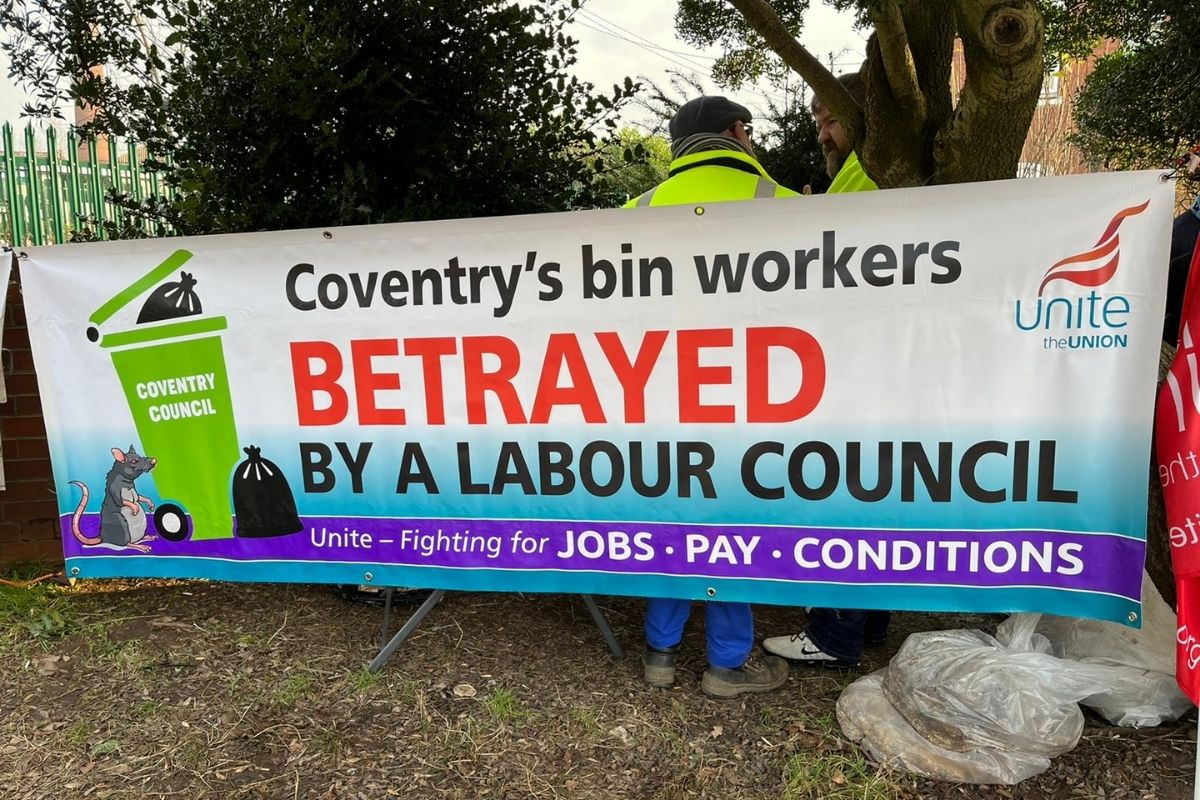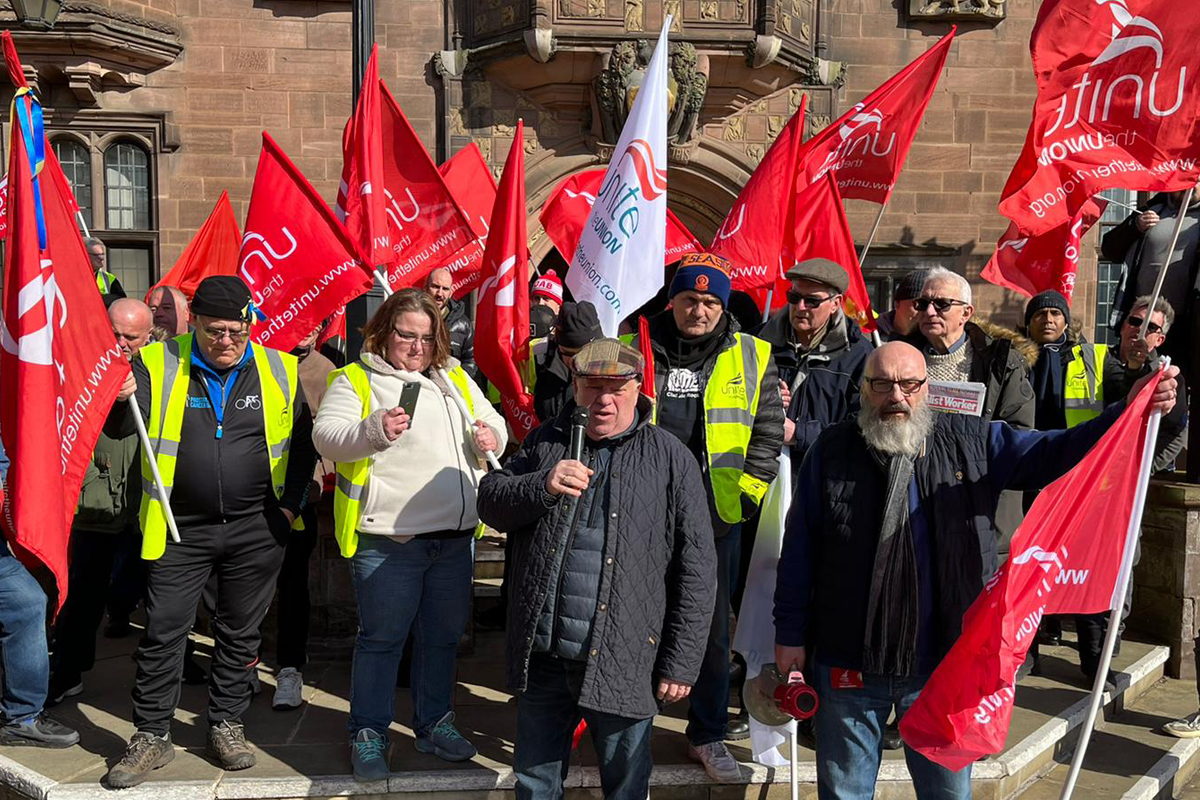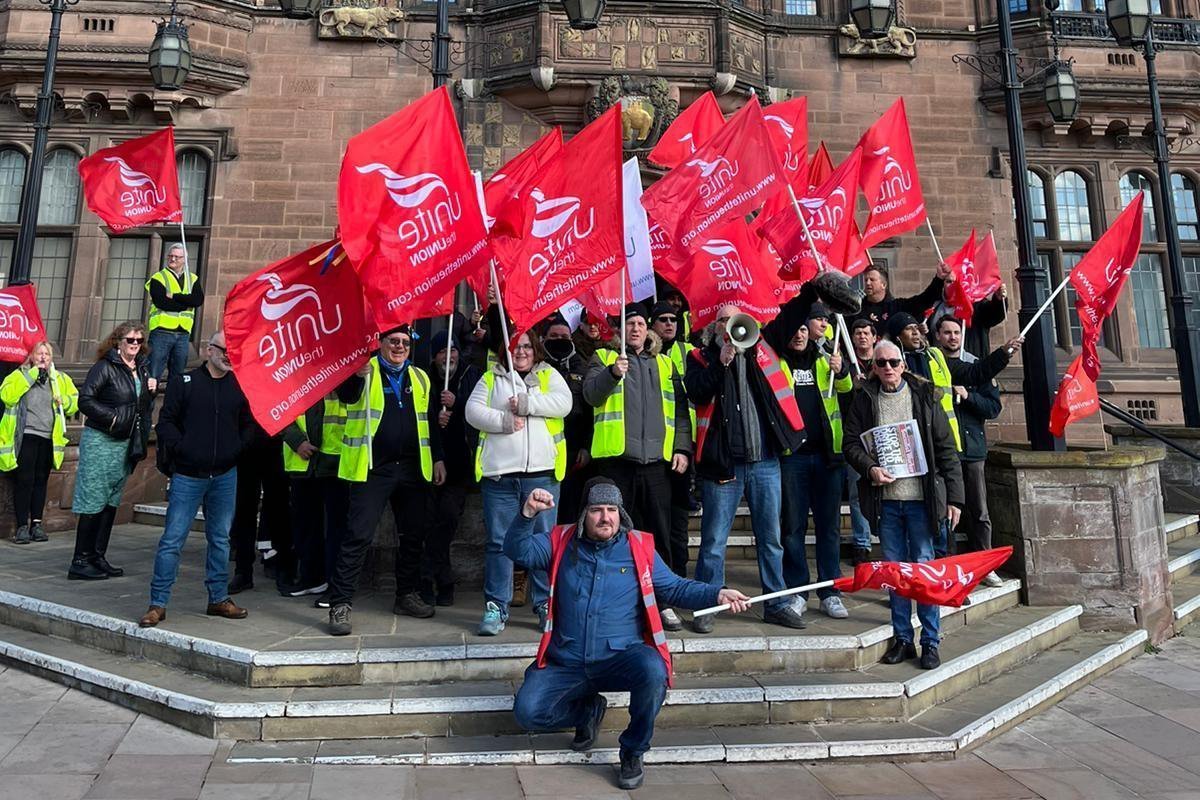Refuse workers at Coventry city council remain determined in their fight for fair pay. Strike-breaking antics and victimisation by the employers has only hardened the resolve. The labour movement must launch a mass fightback against austerity.
The strike of refuse collection drivers employed by Coventry city council, now in its tenth week, has reached a critical juncture.
Following a successful ballot to renew the mandate, with 94% in favour, the strike will now continue into the summer – including through the local elections in May.
Around 70 drivers are out, fighting for decent pay. But so far, negotiations with the Labour-controlled city council have yielded nothing.
To add insult to injury, the council has already spent around £3 million trying to break the strike. Meanwhile, Unite the union, which represents the bin workers, says that it would cost only £300,000 to resolve the dispute.
The council has set up eleven refuse drop-off points across the city, staffed by workers on higher hourly rates than the regular drivers. They have also hired scab labour to drive lorries around the city emptying bins.
The bin collectors, not on strike, have been put in a very awkward position too. Some of them have been directed by management to work with the scab drivers, and are therefore inadvertently helping to break the strike. If they say no, they could also be disciplined.
Victimisation
The council, however, may now have gone a step too far in their attacks on the drivers.
On 9 March, they outrageously suspended the drivers’ shop steward, Pete Randle, in a clear-cut case of trade union victimisation.
Coventry council have suspended one of the reps. Not only are they content trying to pay below the rate for the job, now they’re trying to terrify people.
Today they went down to the council offices demanding a meeting with a leader of the council. They refused. pic.twitter.com/V36KwtB6pT
— Justice For Refuse Workers & Cleansers (@justice4refuse) March 10, 2022
This has pushed tensions to a boiling point. The anger of the strikers in response to this attack was expressed very forcibly the following day, with a boisterous rally outside the Council House.
Here, strikers put forward slogans of “an injury to one is an injury to all” and “Unite, Unite, we stand up and we fight”. One scathing chant was addressed directly to the Labour council: “Shame, shame, shame on you, and shame on you for turning blue!”
If the council thought the strikers would cave in after nine weeks of strike action, then they are sorely mistaken. The suspension of Randle has further hardened the resolve that was already present.
At each turn, the Labour-controlled council has dug itself deeper and deeper into a hole.
At the start of the strike, Labour councillors said that they could not get involved, as the dispute was between Unite and the council’s officers. But what that effectively means is that these unelected bureaucrats run the council, not the elected councillors.
If that is the case, why go through the charade of annual elections to determine the political makeup of the council, if its management can simply be left to these officers?
Austerity

This hands-off approach did not last long, however. With the strikers continuing their struggle, meetings were organised between councillors and strike committee representatives. But these did not yield any results.
The council now finds itself in an insoluble position due to previous policy decisions.
When the Tories first announced public spending cuts following the 2008 capitalist crisis, the Labour council did not launch a mass fightback. In fact, it was commended by the Tory government for the efficiency and effectiveness of its cuts!
Now, the same council is trying to provide services and keep jobs, but with only 40% of the income it had in 2010.
What has been the result over the past decade-or-more of austerity? Services have been cut; wages have been held down; and more than 2,000 council workers have lost their jobs.
Now the council is using every method at its disposal to deprive the bin lorry drivers of a decent wage. They fear a successful strike will see other council workers demand equal pay with the drivers.
Essentially, Coventry city council is standing firm on paying poverty wages to drivers, in order to ensure that it can continue to pay poverty wages to all council workers!
As Unite general secretary Sharon Graham has pointed out, however, some are paid very handsomely by the council.
“A former deputy chief executive, Martin Yardley, was given more money than any other council staff member in the whole country in 2019/20, pocketing £573,660,” Graham noted. “And in 2018, the retiring finance chief waltzed off with just shy of £450,000.”
Quite rightly, Graham has also called for the opening of the council’s books, in order to reveal where the public’s money is really going.
Fightback

Sharon Graham has said that all the resources of the union will be used to win this dispute in Coventry. That is to be welcomed.
National and international support for the strikers has also been growing, as have donations to the hardship fund.
In the coming period, more and more workers will be fighting similar battles. Already, across the country, local government workers organised with Unite have voted to strike in rejection of a measly 1.75% pay offer.
Over the last decade, reduced income for councils up-and-down Britain was the result of cuts arising from a national budget deficit of around £167bn. The national budget deficit from the costs of the pandemic, by comparison, will be around £450bn.
Who will be made to pay for this? Under the Tories – under capitalism – it will be workers in local government, workers across the public sector, and workers in general.
This coming onslaught will be coupled with the surging cost of living and runaway inflation. Already, workers are moving into action, with strikes breaking out left, right, and centre.
This situation demands a fightback from the trade unions – nationally and collectively.
The labour movement must link these issues and strikes together, and coordinate action across the unions – beginning with a one-day public sector wide strike, as the start of a mass campaign to bring down this rotten Tory government.
This must be linked to the fight for a socialist programme, based on the nationalisation of the banks and monopolies who have made millions off the back of exploiting workers. This should be combined with running these nationalised monopolies and industries under the democratic control of workers.
It will only be when the working class runs society that we can guarantee quality public services, with decent pay and conditions for all.






